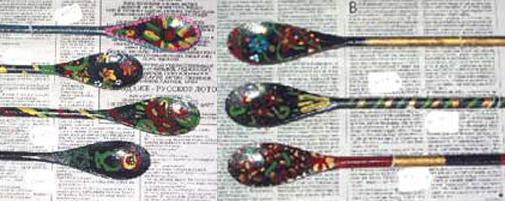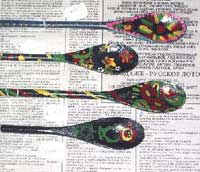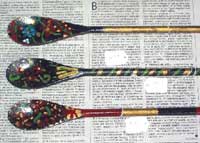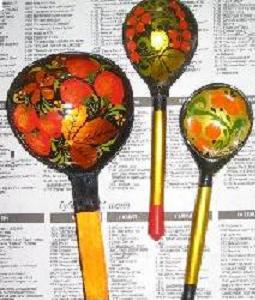
In June 2003 Jewish Community Services organized an inter-generational day with the Bagels Plus group and Massada College Year 4-5 class. The theme was From Russia With Love. There was Russian style dance, a talk about Russia by Rabbi Engel, and Russian food. Roslyn Sugarman talked about Russian Folk Art and everyone was encouraged to paint a wooden spoon in the style of the world-famous Russian decorative craft called Khokhloma.
Spoons by Mushkie, Georgie, Sandy and Simon
Spoons by Lisa, Emma and Kitty
Spoons on loan from Matrioshka, the Russian Shop in Adelaide
About Khokhloma
Floral designs and distinctive colours of scarlet and gold on a black background characterize Khokhloma. Dating from the 17th century, its name derives from the Volga mercantile village of Khokhloma in the northern part of the Gorky region, now a major centre of folk art.
Traditionally people in the country used their time and talents to carve and beautify everyday household objects. Spoons have become one of the favourite souvenirs. Women and girls usually painted them. Around 40 types of spoons of various shapes are produced, made of birch, maple and palm trees. Spoon-makers first cut the wooden blocks with an axe and hollow the spoon by gouging out the extraneous wood. One observer expressed amazement at their knack of using an axe to transform a piece of wood into the daintiest mustard spoon in a mere 15 minutes.
Motifs characterizing Khokhloma ware are simple and poetic, consisting mainly of floral patterns inspired by the native forests – wild flowers, clusters of ash berries interwoven with sweeping grasses, golden foliage, branches and leaves. They also painted wild strawberries, black currants and raspberries.
Khokhloma art suffered a crisis at the turn of last century caused by a rise in the cost of timber and competition from factory-made tableware. As a result, their skill deteriorated. After the October Revolution, the Soviet Government showed a concern for the future of folk arts and promoted the industry, giving them grants and raw materials. Khokloma craft is once again flourishing.




Recent Comments